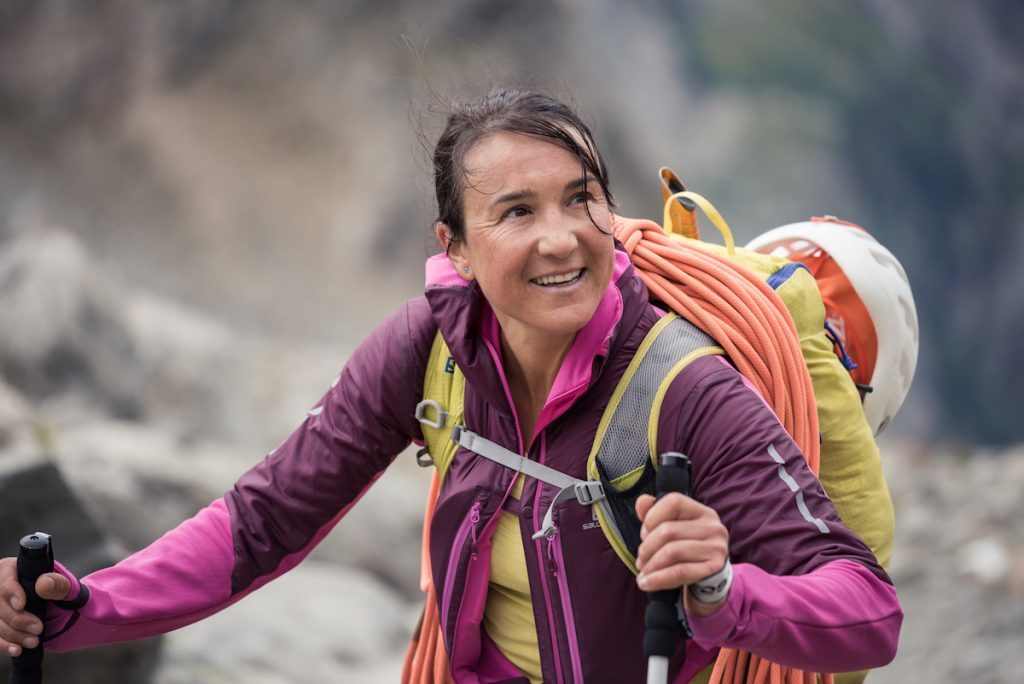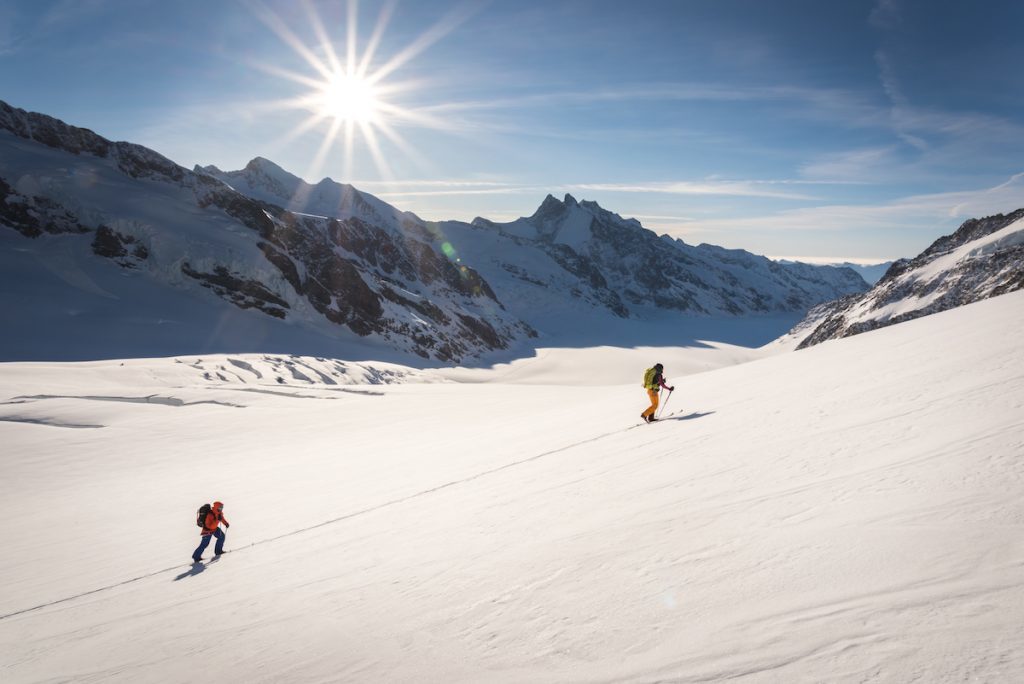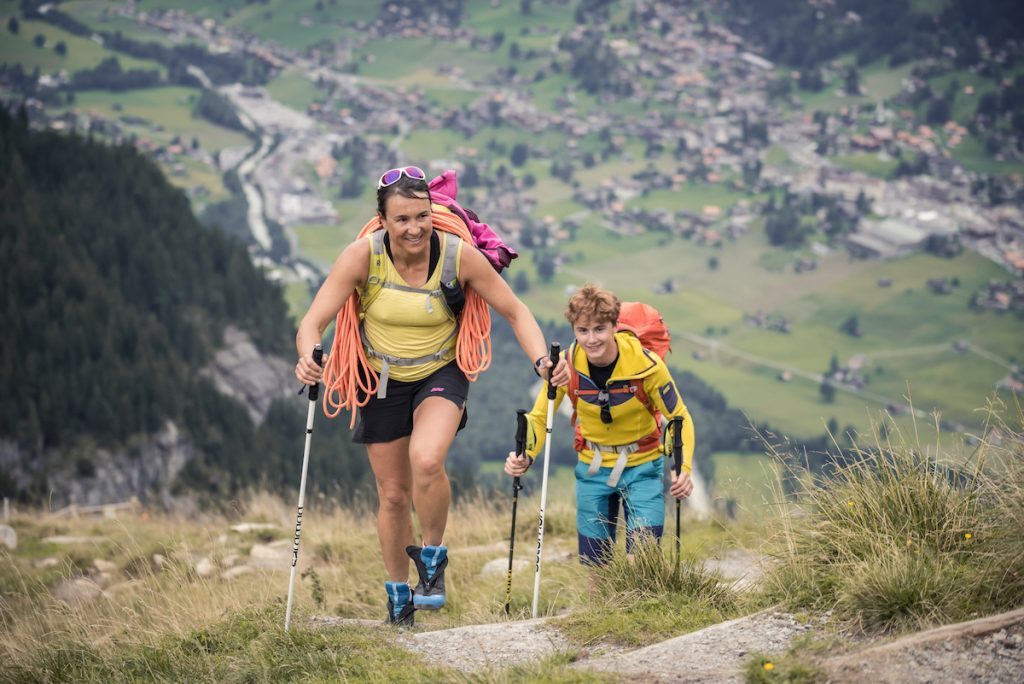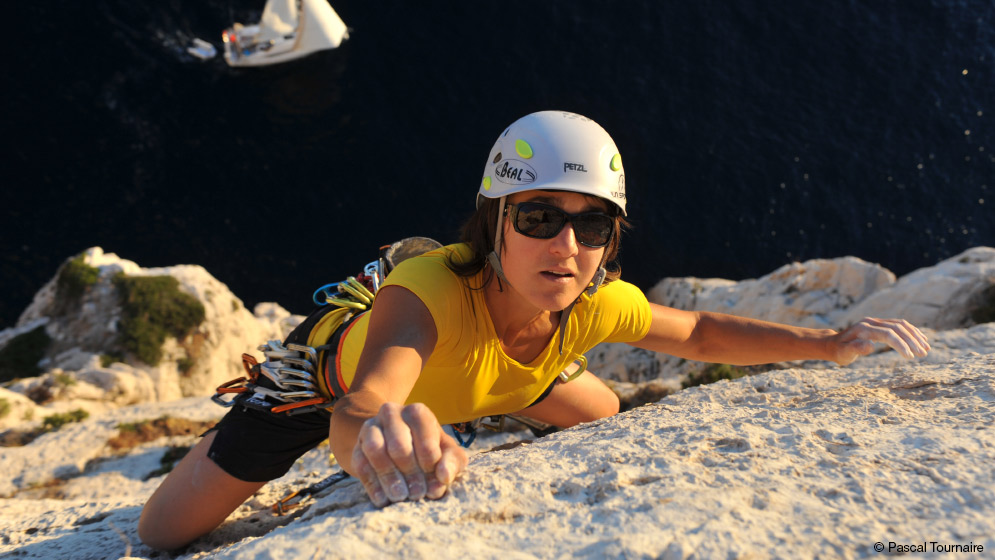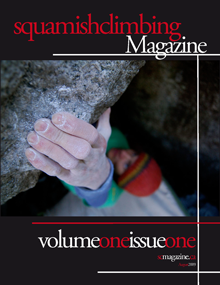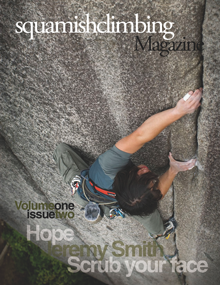The Vancouver International Mountain Film Festival (VIMFF) opens its doors this Friday, February 22nd, 2019, and its first guest speaker is the French climber and International champion, Liv Sansoz.
Professional climber, skier & paraglider, Liv Sansoz lives by the words of former U.S. President Abraham Lincoln: “It’s not the years in your life that count. It’s the life in your years.” She began skiing in the French Alps aged 2 and had climbed Mount Blanc by the age of 14. In her teenage years, Liv took up climbing and at 18 had already won a World Championship, followed by many other international victories. In recent years, the soft-spoken and humble Chamonix resident has become an accomplished paraglider, which allows her to see her beloved mountains from yet another vantage point. Recently, she out to climb, ski and paraglide all of the 82 summits above 4,000 meters in the Alps. She completed the project in early 2018.
We had a chance to catch up with Liv as she made her way to Canada and here is what she had to say.
First off, thanks for taking the time to chat with us. You are opening up this years Vancouver International Mountain Film Festival which is great news for us! What will be the focus of your your presentation?
I love bringing people a bit deeper with us in the mountains and show behind the scenes.
There are too many things behind an ascent, a big project or an expedition we barely talk about while they make the project a success or a not…
Sharing success is often easier than failure. Why do you think it is important to be honest about failure when speaking at events such as this?
Because I think you learn more things from failure than from success and also because with social media, the tendency is to always show the successful happy moments and very rarely the doubts or the failure and all the effort put in that are hidden behind every project.
I want to talk about your most recent endeavour. Two years ago, you decided to climb every Alpine summit over 4,000 metres in a year. Can you tell us a bit about what you wanted to accomplish with this goal?
Over the past five years, I was almost permanently injured with fractures or other injuries. I had a pretty serious base jumping accident in December 2009. Having to stay three months in bed in hospital made my body very weak. After the rehab and when I got into sports again, my bones were so fragile that any little shock such as falling from two meters high in the climbing gym would lead to a broken foot. It’s been like that from 2010 to 2015.
In the first year that I was not injured at all, I found myself on top of some 4000m in the Bernese Alps. I was literally blown away by the beauty of all the 4000m peaks around me and the idea of climbing all of them came quite naturally. With this project, I could combine doing what I love (climbing mountains) with a little challenge and also saying good-bye to the injuries and finding back a bit of confidence you lose so easily when you are injured. It was also a good way to discover more of the Alps, get to know new valleys, huts and summits and to show to others that you can have a very powerful experience next door without having to fly far away.
With such a physical goal for the entire year, were you able to focus on other things?
I knew climbing the 82 4000m peaks of the Alps would be demanding enough that I did not planned on focusing on anything else. There was a lot of logistic to deal with on this trip, there was a lot to focus on to make the right decisions and making a film at the same time added quite a lot of work.
What kind of impact did this have on your body and how did you stay mentally strong throughout?
The hardest impact for me was the sleep deprivation I had towards the end of the summer. At first sleeping in huts was fine but little by little I was more sensitive to the noises and could barely sleep. We also had some really cold bivouacs when you don’t sleep, you just “rest” and can’t wait for the morning to arrive. And on top of that for a lot of summer ascents you have to wake up at 3am when it’s not 1am… At the end my sleep got really weird and even at home I could sleep well anymore. It took me 6 months to recover.
Was the transition to alpine climbing natural for you and what made you want to focus on alpinism?
I grew up in the mountains and have always been attracted by the mountains. I started ski touring when I was eleven and when I was fourteen, I asked my dad to climb Mont Blanc. It’s nothing very technical but not something a little girl of fourteen would normally do. So, doing more alpine ascents and mountaineering now is something that feels totally natural to me.
Did your family have a big influence on your climbing early on and how did you end up getting into competition climbing?
My parents are not climbers. They did not know much about sport climbing, although they are both quite sporty and were doing a lot of ski touring and very easy mountaineering when I was younger. Luckily, they had always been very supportive of me for anything in my life, and especially the day I came back from a competition and told them we had to built a climbing wall in the house.
How do you look back on those early years of competition and how does it impact your outlook on climbing today?
I can only look back with a big smile on my face and I think I’m almost more proud nowadays of what I did back in the years than I was at that time. Back then, I was considering everything as ‘normal’. Becoming a world champion was just a normal thing to do, no big deal. But I think in reality, if I look back, it was hours and hours of training alone, it was moments of doubts and moments of confidence, it was a lot of hard work and also a lot of satisfaction and fun.
Competing is not something easy. It’s sometimes a lot of pressure. It’s painful when all your work does not pay off and it’s extremely rewarding when it works. With competitions, I learned to push myself into a space I did not expected I had. It taught me how to get this very special state of mind where you are both 200% focus and nothing else is here. Then, at the same time, you are detached of what you are doing. Flow is key and you need to find it. Competitions taught me a lot of things, about myself and about the power of our brains. And those things are still very important for my climbing and my life in general nowadays.
How has competition climbing changed since you were younger and do you see it going in a positive direction for the sport and for climbing in general?
Competition climbing has changed in the format and in the type of routes. Shorter routes, more explosive moves, less rest or very coordinating bases boulders – and of course, the level of climbing has improved a lot. Not to mention the speed climbing competition that were almost not existing back in 2000. I think we live a very exciting period of time. The training walls are getting huge and really fun and having such tools at a young age will make for sure the next generation stronger at a younger age. Our knowledge has improved a lot as well, which is all about passion in a way. Climbing is evolving and competitions are pushing athletes to train harder and get stronger and this all pushes away the limit of what everyone thinks is doable or not, which is generally speaking a positive direction.
Regarding the Olympics, it’s a bit sad that the format will be a combination of speed, routes and boulders. For me, that does not make sense and it’s a bit unfair for some extremely talented climbers.
How has outdoor climbing impacted your life and the community around you?
Climbing in general has been my lifestyle for a very long time. It was not me and climbing as two different things. I was a climber. We were one thing. It is a bit different now since I’m more a mountain multi-sport athlete with alpine climbing, skiing, mountaineering, paragliding etc. My community has changed and grown a lot, touching at all those different scene. But for me, it’s one same world, based on a love and respect for the mountains.
I know with the increased popularity, some of our climbing areas are getting pretty beat up. Is climbing also growing in popularity in Europe and how is this impacting local crags and cliffs?
Climbing is growing a lot in Europe as well but mostly in the gyms. It seems to me some the most attractive cliffs of the moment can be quite crowded, which means trash at the base, lots of chalk on the holds, and depending on the type of rock, it can get polished quite fast. On the other hand, there are still a lot of crags not too well known were you can find yourself alone on four stars routes.
At 42 years of age, how has your idea of progression and setting goals changed from when you were younger?
I guess I just put more ‘meaning’ in what I do and I became more picky with the friends and who I want to share projects with. It’s more important now than ever to choose aesthetic projects that make real sense to me.
Finally, do you see climbing being a part of your life forever or will someday you put it down?
Without any doubts, it’ll be something I’ll do till I’ll have to return to dust.
Thanks again for your time Liv! We are really looking forward to seeing you on opening night!
Tickets for Liv Sansoz and the opening night of VIMFF can be found here.
—
Our content would not be possible without our sponsors Flashed Climbing, The Hive Bouldering Gym, Climb Base 5, Climb On Squamish, the Vancouver International Mountain Film Festival, Kilter Grips, Bolder Climbing Community, and Gneiss Climbing. Be sure to give them some love!!
